国际商务英语讲义
- 格式:ppt
- 大小:2.55 MB
- 文档页数:98

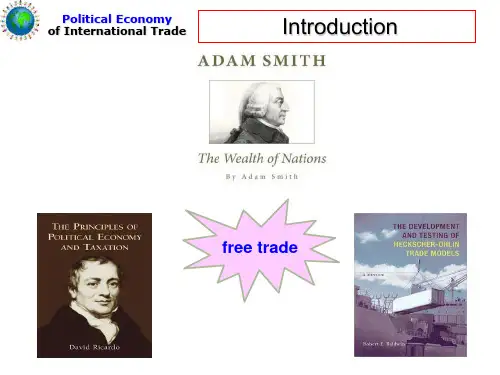
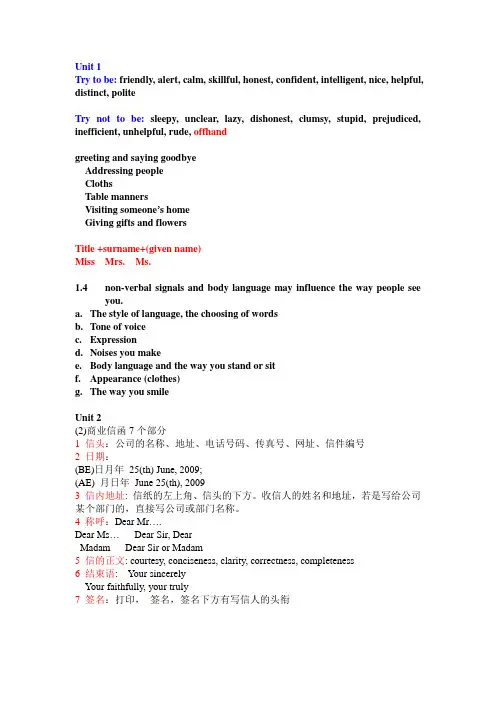
Unit 1Try to be: friendly, alert, calm, skillful, honest, confident, intelligent, nice, helpful, distinct, politeTry not to be: sleepy, unclear, lazy, dishonest, clumsy, stupid, prejudiced, inefficient, unhelpful, rude, offhandgreeting and saying goodbyeAddressing peopleClothsTable mannersVisiting someone’s homeGiving gifts and flowersTitle +surname+(given name)Miss Mrs. Ms.1.4non-verbal signals and body language may influence the way people seeyou.a.The style of language, the choosing of wordsb.Tone of voicec.Expressiond.Noises you makee.Body language and the way you stand or sitf.Appearance (clothes)g.The way you smileUnit 2(2)商业信函7个部分1 信头:公司的名称、地址、电话号码、传真号、网址、信件编号2 日期:(BE)日月年25(th) June, 2009;(AE) 月日年June 25(th), 20093 信内地址: 信纸的左上角、信头的下方。
收信人的姓名和地址,若是写给公司某个部门的,直接写公司或部门名称。
4 称呼:Dear Mr….Dear Ms…Dear Sir, DearMadam Dear Sir or Madam5 信的正文: courtesy, conciseness, clarity, correctness, completeness6 结束语: Y our sincerelyY our faithfully, your truly7 签名:打印,签名,签名下方有写信人的头衔Common abbreviations& Co. =and company@ =at(a price of)..a/c = accountadmin. = administrationapprox. = approximatelyASAP or asap = as soon as possibleattn = for the attention ofb/f = brought forwardc.c. = cubic centimetrec.c. / cc = carbon copy (photocopy)c/f = carried forwardc/o = care ofCEO = chief executive officerCorp. = Corporationdept. = departmentdo = ditto (the same)doz. Or dz. = dozenea. = eachenc./encl. = enclosureetc. = and so onft = foot/ feetincl.= including / inclusivelb / lbs = pound(s)i.e./ ie = that isInc. = incorporatedLtd. = LimitedMD = managing directorMisc. = miscellaneousN/A = not applicableNo.(US#) =numberoz. = ouncep.a. = per annum/ per yearp.p. = per pro (on behalf of )PA = personal assistantPC = personal computerplc/p.l.c. = public limited corporationPOB = Post Office Box PS/P.S. = postscript Rd = roadrecd = receivedref. = referenceSq. = squareSt. = streetyd / yds = yard(s)R = Registered trademarkC = copyrightTM = trade markUnit 33.2 Getting people to do thingsrequesting: agreeing to or refusing requestsoffering to help:accepting or rejecting offersasking permission:giving or refusing permissionunit 4•City college of Wuhan University of Science and Technology•Special No.1 Huang Jia Da Wan•East Lake Scenery District•Wuhan•Hubei 430083•China4.1 Amake notes & take notes•Note-making: noting down ideas before writing a report or letter or before a phone call or meeting. 打底稿,写笔记•Note-taking: taking notes after or during a conversation or meeting. 做记录4.2 reportA good report•is well researched and logically presented•provides enough information to enable decisions to be made•uses a style appropriate for the purpose•is accurate, clear and concise•supports all claims and conclusions with evidence4.3 planning and editing a report•When planning a report there are two main points to consider:•1. the purpose•2. the readerA Procedure of making report•Assemble the material•Plan the report•Draft the report•Edit the reportStructure of the report•Title page•Table of contents•Summary•Terms of reference•Procedure(interviews, meetings,published sources, observation,visits,questionnaires,scientific measurement)•Findings (main part)•Conclusions•Recommendations•Appendices•Bibliography/ReferenceUnit 55.1 workplace•A business organization can be defined as a firm, a company, a business or a corporation that makes, buys or sells goods, or provides services, to make a profit. 5.2 different kinds of company•Sector行业: a part of economy•Industry产业:organized activity producing goods or services, for example food, banking, construction, steel, tobacco and biotechnology.•Primary—oil,agriculture, fishing, mining, construction•Secondary—crafts and manufacturing•Teriary—services, including education, banking, insurance, tourism, leisure, etc.••UK US•Board of DirectorsChairman PresidentManaging Director Chief Executive OfficerDeputy Managing Director Vice PresidentGeneral Manager DirectorDepartment Manager ManagerAccountant Financial ControllerUnit 7The concept of international trade●International trade, also known as world trade, is the fair and deliberate exchange of goods and services across national boundaries.It concerns trade operations of both import and export and includes the purchase and sale of both visible and invisible goods.6.1 exchanging information●V ersion 1-hostile, aggressive,impatient, informal●V ersion 2-friendly, helpful, formal, polite●Their tone of voice, the way they hesitate, the polite forms they use6.4 Placing and filling ordersOrders—fax /letter1. 感谢对方的报盘或样品,表示愿意定购2. 对商品加以详细说明,主要包括数量、货号、价格3. 说明包装方式、目的港及运装期Acknowledging of the order1. 对收到订单表示高兴2. 重复订单的条件3. 交货、寄送单据等4. 希望再次合作Unit 87.2 cash flow•Cash: money in notes and coins•Currency: coins and banknotes of a particular country•Cash flow: refers to the movement of cash into or out of a business, a project, or a financial product. It is usually measured during a specified, finite period of time.。
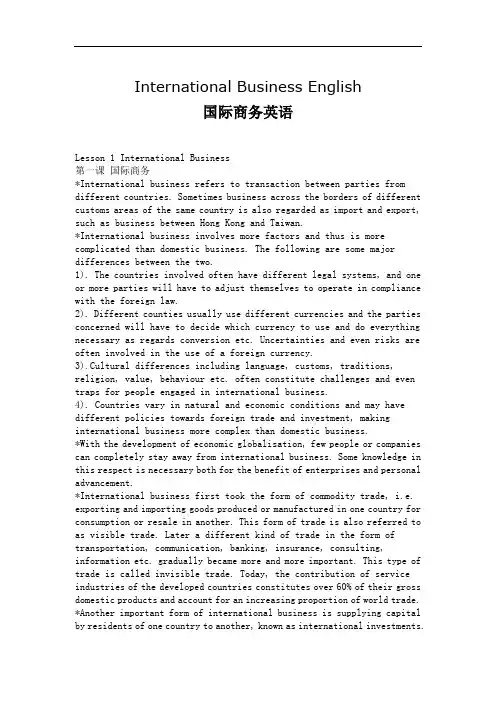
International Business English国际商务英语Lesson 1 International Business第一课国际商务*International business refers to transaction between parties from different countries. Sometimes business across the borders of different customs areas of the same country is also regarded as import and export, such as business between Hong Kong and Taiwan.*International business involves more factors and thus is more complicated than domestic business. The following are some major differences between the two.1). The countries involved often have different legal systems, and one or more parties will have to adjust themselves to operate in compliance with the foreign law.2). Different counties usually use different currencies and the parties concerned will have to decide which currency to use and do everything necessary as regards conversion etc. Uncertainties and even risks are often involved in the use of a foreign currency.3).Cultural differences including language, customs, traditions, religion, value, behaviour etc. often constitute challenges and even traps for people engaged in international business.4). Countries vary in natural and economic conditions and may have different policies towards foreign trade and investment, making international business more complex than domestic business.*With the development of economic globalisation, few people or companies can completely stay away from international business. Some knowledge in this respect is necessary both for the benefit of enterprises and personal advancement.*International business first took the form of commodity trade, i.e. exporting and importing goods produced or manufactured in one country for consumption or resale in another. This form of trade is also referred to as visible trade. Later a different kind of trade in the form of transportation, communication, banking, insurance, consulting, information etc. gradually became more and more important. This type of trade is called invisible trade. Today, the contribution of service industries of the developed countries constitutes over 60% of their gross domestic products and account for an increasing proportion of world trade. *Another important form of international business is supplying capital by residents of one country to another, known as international investments.Such investments can be classified into two categories. The first kind of investments, foreign direct investments or FDI for short is made for returns through controlling the enterprises or assets invested in in a host country.*The host country is a foreign country where the investor operates, while the country where the headquarters of the investor is located is called the home country. The second kind of investment, portfolio investment, refers to purchases of foreign financial assets for a purpose other than controlling. Such financial assets may be stocks, bonds or certificates of deposit.Stocks are also called capital stocks or bonds. Bonds are papers issued by a government or a firm with promise to pay back the money lent or invested together with interest. The maturity period of a bond is at least one year, often longer, for example five, or even ten years. Certificates of deposit generally involve large amounts, say 25 thousand US dollars *Besides trade and investment, international licensing and franchising are sometimes taken as a means of entering a foreign market. In licensing, a firm leases the right to use its intellectual property to a firm in another country. Such intellectual property may be trademarks, brand names, patents, copyrights or technology. Firms choose licensing because they do not have to make cash payments to start business, and can simply receive income in the form of royaltyBesides, they can benefit from locational advantages of foreign operation without any obligations in ownership or management. The use of licensing is particularly encouraged by high customs duty and non-tariff barriers on the part of the host country. However it is not advisable to use licensing in countries with weak intellectual property protection since the licensor may have difficulty in enforcing licensing agreement.*Franchising can be regarded as a special form of licensing. Under franchising, a firm, called the franchisee, is allowed to operate in the name of another, called the franchiser who provides the former with trademarks, brand names, logos, and operating techniques for royalty. In comparison with the relation between the licenser and the licensee, the franchiser has more control over and provides more support for the franchisee.*The franchiser can develop internationally and gain access to useful information about the local market with little risk and cost, and the franchisee can easily get into a business with established products or services. Franchising is fairly popular especially in hotel and restaurant business.*Other forms for participating in international business are management contract, contract manufacturing, and turnkey project.*Under a management contract, one company offers managerial or other specialized services to another within a particular period for a flatpayment or a percentage of the relevant business volume. Sometimes bonuses based on profitability or sales growth are also specified in management contracts.Government policies often have a lot to do with management contracts. When a government forbids foreign ownership in certain industries it considers to be of strategic importance but lacks the expertise for operation, management contracts may be a practical choice enabling a foreign company to operate in the industry without owning the assets*By contract manufacturing, a firm can concentrate on their strongest part in the value chain, e.g. marketing, while contracting with foreign companies for the manufacture of their products. Such firms can reduce the amount of their resources devoted to manufacture and benefit from location advantages from production in host countries. However, loss of control over the production process may give rise to problems in respect of quality and time of delivery.*For an international turnkey project, a firm signs a contract with a foreign purchaser and undertakes all the designing, contracting and facility equipping before handing it over to the latter upon completion. Such projects are often large and complex and take a long period to complete. Payment for a turnkey project may be made at fixed total price or on a cost plus basis. The latter way of payment shifts the burden of possible additional cost over the original budget onto the purchaser *BOT is a popular variant of the turnkey project where B stands for Build, O for operate and T for transfer. For a BOT project, a firm operate a facility for a period of time after building it up before finally transferring it to a foreign company. Making profit from operating the project for a period is the major difference between BOT and the common turnkey project. Needless to say, the contractor has to bear the financial and other risks that may occur in the period of operation.*Some Words and Expressionscustoms area 关税区in compliance with 遵从,遵照conversion n.货币兑换visible trade 有形贸易resale n.转售invisible trade 无形贸易gross domestic product 国内生产总值for short 缩写为account for 占……比例headquarters n.总部trap n.陷阱,圈套portfolio investment 证券投资stocks n.股票bonds n.债券maturity n.(票据等)到期,到期日certificate of deposit 大额存单other than 而不是licensing n.许可经营franchising n.特许经营n.商标advisable adj.可行的,适当的patent n.专利royalty n.专利使用费,许可使用费,版税copyright n.版权licensor n.给予许可的人licensee n.接受许可的人franchiser n.给予特许的人franchisee n.接受特许的人logo n.标识,标记management contract 管理合同expertise n.专门知识bonus n.红利,奖金,津贴flat adj.一律的,无变动的contract manufacturing 承包生产value chain 价值链turnkey project 交钥匙工程BOT(Build, Operate, Transfer)建设,经营,移交Stand for 表示,代表variant n.变形,变体Lesson twoIncome Level and the World Market第二课收入水平和世界市场This lesson discusses the relation between the income level and the market potential, and the features of high income, middle income and low income markets.Special analysesare made on Triad, i.e. the markets of North America, European Union and Japan, as well as other markets that are closely related with China.The first two paragraphs mainly deal with GNP and GDP, two important concepts usedto indicate the total size of an economy. GDP, Gross Domestic Product, stresses the place of production while GNP, Gross National Product, on the ownership of production factors.GDP is used by most countries now where as GNP was more popular before the 1990s. The actual figures of a country’s GNP and GDP are, however, quite similar in most cases and we can use whichever figure that is available.TEXT:In assessing the potential of a market, people often look at its income level since it provides clues about the purchasing power of its residents. The concepts national income and national product have roughly the same value and can be used interchangeably if our interest is in their sum total which is measured as the market value of the total output of goodsand services of an economy in a given period, usually a year. The differenceis only in their emphasis. The former stresses the income generated by turning out the products while the latter, the value of the product s themselves. Gross National Product, GNP, and Gross Domestic Product, GDP, are two important concepts used to indicate a country’s total income. GNP refers to the market value of goods and services produced by the property and labor owned by the residents of an economy. This term was used by most governments before the 1990s国民生产总值(GNP)是最重要的宏观经济指标,它是指一个国家地区的国民经济在一定时期(一般1年)内以货币表现的全部最终产品(含货物和服务)价值的总和。
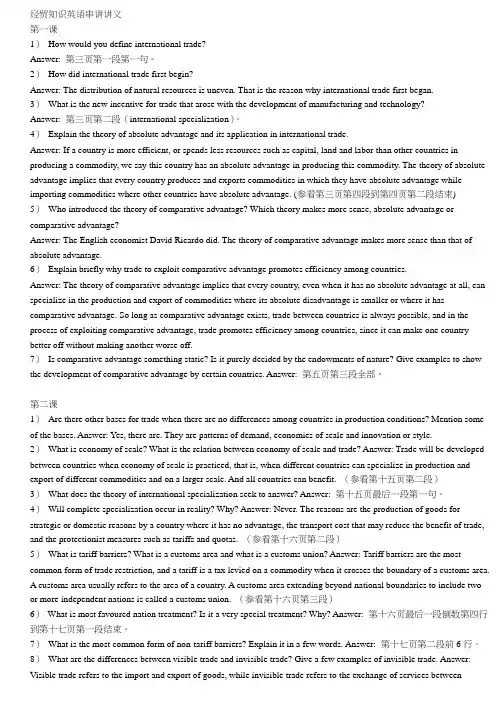
经贸知识英语串讲讲义第一课1)How would you define international trade?Answer: 第三页第一段第一句。
2)How did international trade first begin?Answer: The distribution of natural resources is uneven. That is the reason why international trade first began.3)What is the new incentive for trade that arose with the development of manufacturing and technology?Answer: 第三页第二段(international specialization)。
4)Explain the theory of absolute advantage and its application in international trade.Answer: If a country is more efficient, or spends less resources such as capital, land and labor than other countries in producing a commodity, we say this country has an absolute advantage in producing this commodity. The theory of absolute advantage implies that every country produces and exports commodities in which they have absolute advantage while importing commodities where other countries have absolute advantage. (参看第三页第四段到第四页第二段结束)5)Who introduced the theory of comparative advantage? Which theory makes more sense, absolute advantage or comparative advantage?Answer: The English economist David Ricardo did. The theory of comparative advantage makes more sense than that of absolute advantage.6)Explain briefly why trade to exploit comparative advantage promotes efficiency among countries.Answer: The theory of comparative advantage implies that every country, even when it has no absolute advantage at all, can specialize in the production and export of commodities where its absolute disadvantage is smaller or where it has comparative advantage. So long as comparative advantage exists, trade between countries is always possible, and in the process of exploiting comparative advantage, trade promotes efficiency among countries, since it can make one country better off without making another worse off.7)Is comparative advantage something static? Is it purely decided by the endowments of nature? Give examples to show the development of comparative advantage by certain countries. Answer: 第五页第三段全部。
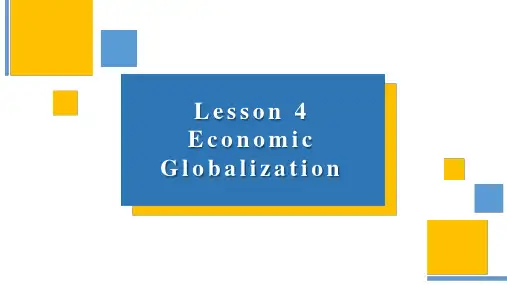
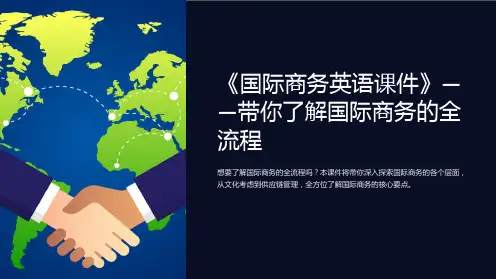
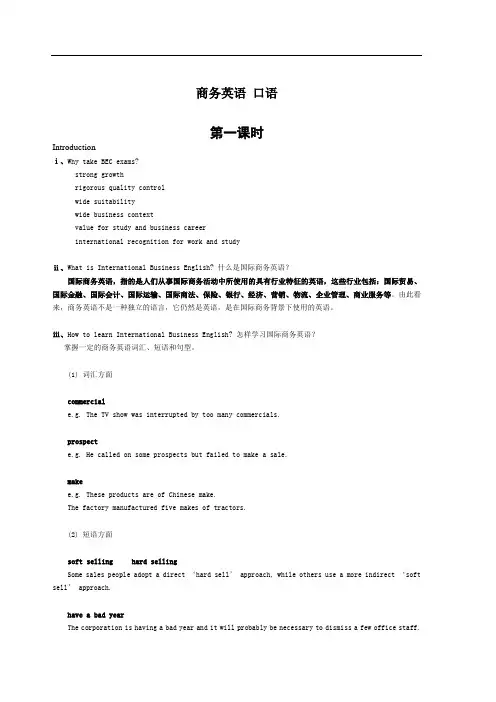
商务英语口语第一课时Introductionⅰ、Why take BEC exams?strong growthrigorous quality controlwide suitabilitywide business contextvalue for study and business careerinternational recognition for work and studyⅱ、What is International Business English? 什么是国际商务英语?国际商务英语,指的是人们从事国际商务活动中所使用的具有行业特征的英语,这些行业包括:国际贸易、国际金融、国际会计、国际运输、国际商法、保险、银行、经济、营销、物流、企业管理、商业服务等。
由此看来,商务英语不是一种独立的语言,它仍然是英语,是在国际商务背景下使用的英语。
ⅲ、How to learn International Business English? 怎样学习国际商务英语?掌握一定的商务英语词汇、短语和句型。
(1) 词汇方面commerciale.g. The TV show was interrupted by too many commercials.prospecte.g. He called on some prospects but failed to make a sale.makee.g. These products are of Chinese make.The factory manufactured five makes of tractors.(2) 短语方面soft selling hard sellingSome sales people adopt a direct ‘hard sell’ approach, while others use a more indirect ‘soft sell’ approach.have a bad yearThe corporation is having a bad year and it will probably be necessary to dismiss a few office staff.break into/penetrate the marketThere is chance that we’ll manage to break into the UK market(3) 句型方面I am writing to you concerning… You can’t miss it. I can’t agree more. It may have slipped your mind, but… You can always reach me at the number… We would very much appreciate it if you could…I noted with interest your advertisement for… Yes, that’s true, but on the other hand… That’s exactly what I think. Maybe, but don’t you think…? You are wanted on the phone. As req uested, we enclose for your attention…(4) 旧词“新义“honoure.g, All credit cards honoured here. The bank honoured this cheque.covere.g. I have got myself covered against fire.royaltye.g. Besides copyright, the writer got a 10 percent royalty on sales. The technology transfer fee shall be paid in royalties.(5) 同义词、近义词、相似词的辨析。
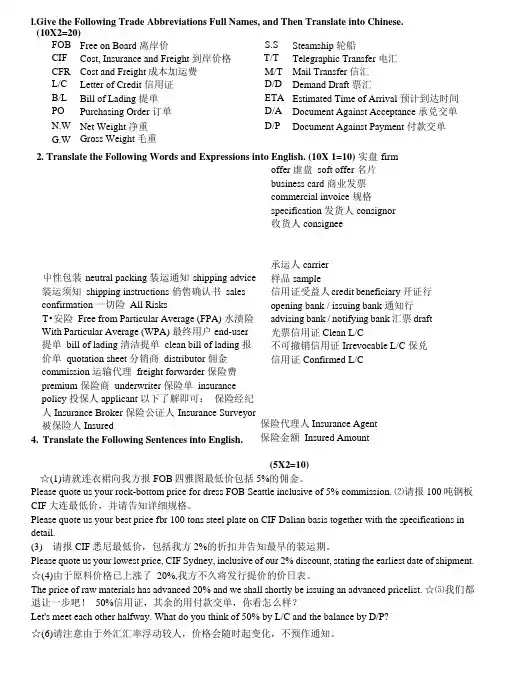
l.Give the Following Trade Abbreviations Full Names, and Then Translate into Chinese.(10X2=20)FOB Free on Board 离岸价 S.S Steamship 轮船CIF Cost, Insurance and Freight 到岸价格 T/T Telegraphic Transfer 电汇CFR Cost and Freight 成本加运费 M/T Mail Transfer 信汇L/C Letter of Credit 信用证 D/D Demand Draft 票汇B/L Bill of Lading 提单 ETA Estimated Time of Arrival 预计到达时间PO Purchasing Order 订单 D/A Document Against Acceptance 承兑交单N.W Net Weight 净重 D/P Document Against Payment 付款交单G.W Gross Weight 毛重屮性包装 neutral packing 装运通知 shipping advice装运须知 shipping instructions 俏售确认书 salesconfirmation 一切险 All RisksT •安险 Free from Particular Average (FPA) 水渍险With Particular Average (WPA) 最终用户end-user提单 bill of lading 清洁提单 clean bill of lading 报价单 quotation sheet 分销商 distributor 佣金commission 运输代理 freight forwarder 保险费premium 保险商 underwriter 保险单 insurancepolicy 投保人applicant 以下了解即可: 保险经纪人Insurance Broker 保险公证人 Insurance Surveyor被保险人Insured4. Translate the Following Sentences into English. Please quote us your rock-bottom price for dress FOB Seattle inclusive of 5% commission. ⑵请报100吨钢板CIF 大连最低价,并请告知详细规格。
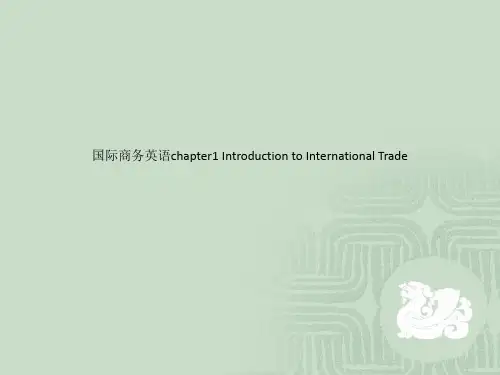
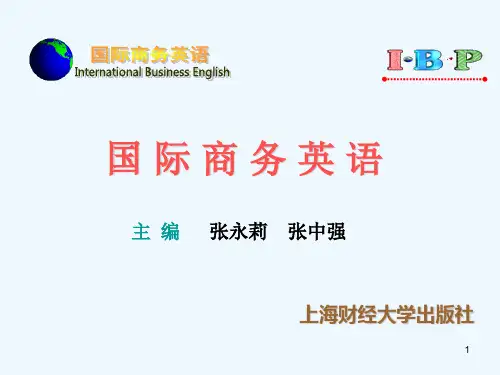
derek callan 商务英语讲义引言概述:Derek Callan商务英语讲义是一本专门针对商务领域的英语学习教材。
本文将从五个大点出发,详细阐述该讲义的内容,包括语法、词汇、商务写作、商务口语以及商务文化等方面的内容。
最后,通过总结,将强调该讲义的专业性和详细性。
正文内容:1. 语法:1.1 语法基础知识:Derek Callan商务英语讲义首先介绍了商务英语中的基础语法知识,包括时态、语态、语法结构等方面的内容。
1.2 商务语境下的语法应用:该讲义通过实例和练习,帮助学习者理解和应用商务语境下的语法规则,例如商务信函中的语法要求、会议讨论中的语法应用等。
2. 词汇:2.1 商务词汇积累:Derek Callan商务英语讲义提供了丰富的商务词汇,帮助学习者扩展商务领域相关的词汇量。
2.2 词汇运用技巧:该讲义通过词汇练习和实际案例,教授学习者如何正确运用商务词汇,包括词汇搭配、词义辨析等方面的技巧。
3. 商务写作:3.1 商务信函写作:Derek Callan商务英语讲义详细介绍了商务信函的写作要点,包括信函格式、用语规范、礼貌用语等内容。
3.2 商务报告写作:该讲义通过案例和范文,指导学习者如何撰写商务报告,包括结构、语言风格、数据分析等方面的要求。
4. 商务口语:4.1 会议讨论技巧:Derek Callan商务英语讲义教授学习者在商务会议中的口语表达技巧,包括提出建议、阐述观点、回应问题等方面的技巧。
4.2 商务演讲技巧:该讲义通过实例和练习,帮助学习者提高商务演讲的能力,包括演讲结构、语言运用、肢体语言等方面的技巧。
5. 商务文化:5.1 跨文化交际:Derek Callan商务英语讲义介绍了跨文化交际中需要注意的文化差异,帮助学习者更好地进行国际商务沟通。
5.2 商务礼仪:该讲义详细解析了商务场合的礼仪规范,包括商务拜访、商务宴请、商务礼仪等方面的内容。
总结:综上所述,Derek Callan商务英语讲义是一本内容丰富、专业详细的商务英语学习教材。
International Business EnglishLesson 1International BusinessBusiness Knowledge:The major differences between international business and domestic businessA.Differences in legal systemsB.Differences in currenciesC.Differences in cultural backgroundD.Different in natural and economic conditionsThe major types of international businessA. Trademodity tradeb.Service tradeB. Investmenta.Foreign direct investmentb.Portfolio investmentC. Other typesa.Licensing and franchisingb.Management contract and contract manufacturingc.Turnkey project and BOTTrade Terms:1.Customs area关税区:2.Conversion货币兑换3.Visible trade有形贸易: The form of commodity trade, i.e. exporting and importing goods produced or manufactured in one country for consumption or resale in another. (including cash transaction-bymeans of money and market, and counter trade)4.Invisible trade无形贸易: The form of transportation, communication, banking, insurance, consulting, information etc. is called invisible trade or service industries.5.FDI外国直接投资: Foreign direct investments. Returns through controlling the enterprises or assets invested in a host country. / P.256. One country acquires assets in a foreign country for the purpose ofcontrolling and managing them.6.Portfolio investment证券投资: Purchases of foreign financial assets for a purpose other than controlling.7.Stocks股票: Capital stocks or bonds.8.Bonds债券: The papers issued by a government or a firm with promise to pay back the money lent or invested together with interest.9.Maturity(票据等)到期10.Certificate of deposit大额存单11.Licensing许可经营: In licensing, a firm leases the right to use its intellectual property to a firm in another country. They choose licensing because they do not have to make cash payments to statbusiness, and can simply receive income in the form of royalty.12.Franchising特许经营: Under franchising, franchisee is allowed to operate in the name of another, franchiser who provides the former with trademarks, brand names, logos and operating techniques forroyalty.13.Trade Mark商标14.Patent专利15.Royalty专利(许可)使用费,版税16.Copyright版权17.Licenser许可方18.Licensee被许可方19.Franchiser特许方: A firm who provides the franchisee with trademarks, brand names, logos and operating techniques for royalty.20.Franchisee被特许方: A firm is allowed to operate in the name of another.21.Management contract管理合同: Under a management contract, one company offers managerial or other specialized services to another within a particular period for a flat payment or a percentage ofthe relevant business volume.22.Value chain价值链23.Turnkey project“交钥匙”工程: For an international turnkey project, a firm signs a contract with a foreign purchaser and undertakes all the designing, contracting and facility equipping before handingit over to the latter upon completion.24.BOT建设、经营和移交: Build, Operate, Transfer25.Expertise专门知识26.Bonus红利、奖金、津贴27.Royalty 许可使用费28.International investment国际投资: Supplying capital by residents of one country to another.29.Contract manufacturing承包生产30.GATT关贸总协定: General Agreement on Tariffs and Trade31.International business国际商务: Transaction between parties from different countries. Sometimes business across the borders of different customs areas of the same country is also regarded as importand export.32.Intellectual property知识产权33.Oil deposit: 石油储备= oil reserves34.the reserves of natural resources 自然资源储备35.Personal advancement个人的晋升,个人素质的提高以及个人事业的进步等。